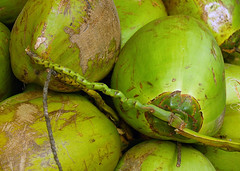I am a farmer.
I plant coconut trees and sell its fruits at the local market.
I am thinking about opening a new grove to plant more coconut trees.
It costs me $1000 to clear up the area, buy new seedlings and plant them. It costs me $250 a year to tend them till they bear fruit which is about 5 years time. The grove can supply me 1000 nuts a year, and I can sell them for $1 each. I think I can sell 80% of the nuts each year. The trees are fruitful for 5 years. And each year I pay a rent of $150 for the grove.
Should I make this long term investment?
The total costs over 10 years are $5000 and I get in return $4000. And so I make less money than I spend over the 10 years.
Or so as I see them now.
I can be wrong, even very wrong, for I do not know all things.
In fact I may not know anything at all.
There is a chance, however, that I may be right in some things.
But probability can be an entirely irrelevant thing.
A small chance may not happen too often, but it can; and when it does, all that have happened in the past may be rendered obsolete, your plans meaningless, and you, a fool. As is quoted more often than believed, history is no predictor of the future.
For example, year after year, coconut trees grow from my sandy soil near the beach, but one day an earthquake happened somewhere faraway in the world, some glaciers melted, and my island home is submerged and gone forever. Or maybe one day a coconut seedling infestation occurs and no more coconuts can grow on my island.
You may say that is OK, as long as the continuity of things remains typical and does not happen tomorrow when I am making plans and planting my new coconut grove. Rare occurrence are just what they are, happening once in a thousand or ten thousand years. And many thousand of years have past without such rare occurrences.
That is true. But tomorrow can be that day in a thousand years.
And it may not be a tsunami or an infestation. Perhaps the world tomorrow may no longer like coconuts for whatever reasons. Or on the other hand the world may discover that coconut is the raw material for the new green fuel that will save the earth.
I don't really know.
And then even if things happen exactly as I have guessed or calculated in my planning, it does not mean I made a poor decision to invest in my money losing coconut grove.
For it may be the best alternative I can do with my time, effort and resources today. And if I did something else - or nothing - I may be losing more money in the future. And then although my coconut still sells for $1 five years hence, that same $1 may buy me much more then than now.
So just as I can fantasized bad things, so too can I, good ones. What then do I believe and do?
Do I merely look at the good things I have imagined - some call this attitude, positive - or is there something less wishful and more valid than being merely positive or negative?
Do I proceed to prepare for my new coconut grove, buying seedlings and clearing the undergrowth and so on? Or do I sit paralysed by the imponderables, and let day after day passed in inaction?
I can of course rationalised some things.
First, the world will continue in its continuity as was the case most of the time. Then I can try to think, detect, speculate, what might throw a spanner into this continuity and upset it. And lastly I can imagine all kinds of catastrophic global events that completely change the world.
The latter however is not very useful. An event leading to the extinction of species makes irrelevant whether I make or lose money in coconuts. There is no use for money when I have no one to trade with.
From the continuity of history, I can study it, try to discern and detect its fundamental, constant drivers - if there are such things - and eventually to model it, from which to make predictions, do what-ifs conjectures, and develop plans and alternatives, and hedge my bets, and so on.
But even so I know there are no guarantees, despite there being a vast array of tools, expertise and experiences doing such things. Sometimes my insights are true, sometimes its all guesswork. Sometimes I missed the obvious, and sometimes the obvious turns out irrelevant. And when it fails, it can be very bad.
But it frees me from paralysis. It is something I can do. It may be futile but it may work too, and by action I can discover and learn things.
And then I do not stop there too. I can go on to try to guess what might create a discontinuity, conditions when my model may fail, with techniques such as scenario planning. Of course I know there are imperfections here too.
For example I do not think there was any scenario made about this collapse of the financial system. Or any about the price of oil skyrocketing to more than $150 a barrel one moment and diving to $30 the next.
I will include a global flu or some other sort of pandemic scenario because I have seen it and the world knows that there is such a thing. But it will be hard to include something the world has no experience or knows nothing about. No one will believe me even if I have seen it.
In hindsight people may say the signs for the present are always there in the past, but it is perhaps something humanly impossible to detect before the present.
For example even as far back as 2007, analysts have seen the possibility of sub prime mortgage loans being problematic, but, I think - as I have not read or heard anything contrary - no one predicted Depression 2.0 from that relatively small thing.
Further, I, the coconut farmer, needs tons of resources, knowledge, access to data, and time and, of course, lots of money too, just to do all these analysis, be it to model the demand and prices for my coconuts five years hence, or to detect the future scenarios and their drivers, hidden today but significant tomorrow, and to position myself to profit from them.
And it will certainly cost me more than I can ever earn from my coconuts, even if such services are available to me. And then it may not be any better than my intuitions.
And so what do I do?
Perhaps I just go on to do what I know what to do, namely to plant coconut trees, tend them to fruitful trees, harvest these fruits and bring them to the local market to sell. I will of course be fully aware and have experienced of all the uncertainties in the weather, climate, the market, the prices of things, and so on.
And so perhaps also I will pray, make sacrifices or do anything to please a god - any god - or gods, those that I know about, who can perhaps control tomorrow, and make these gods hear me, accede to my wishes, and make future conditions favourable for me. I am fully aware that I am limited in what I know and can do: the gods always have a say.
Chance is God's say in anything.
However there is an inherent contradiction here.
For if I can beseech my gods and make them hear me, to make them accede to my wishes, why just stop at coconut's prices?
It is just like having one opportunity to make one certain wish: I would have wished that all my wishes I wished thereafter be certain ones too.
So really, if I have such god or gods, I can do anything - plant mangoes or rear chickens or open a beach front pub instead of tending coconut trees, and even anything seemingly foolish, irrational, and laughable in the light of all the world's wisdom. For conditions, even global ones, can be shifted and changed tomorrow to transform my foolishness into something wise, good and profitable.
Unless, of course, these god or gods are limited in their reach and has restricted capabilities, and I just cannot wish any wish. And then they may be no better than we ourselves, the collective humankind.


